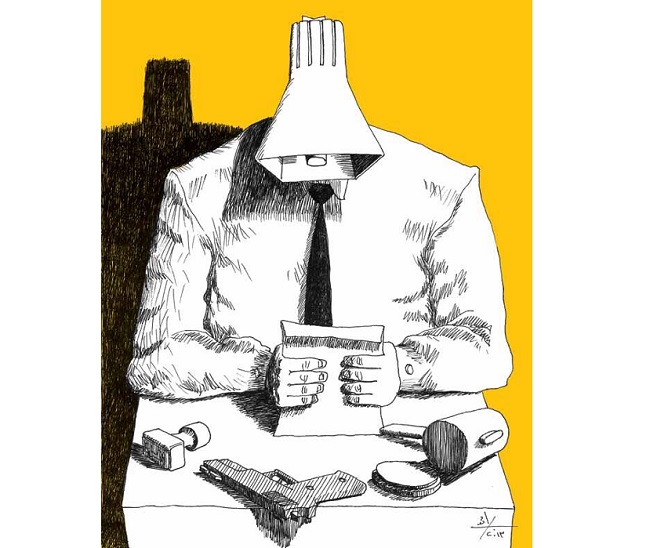Paying for Talent: The Risks of Actor Evaluation Workshops

Several weeks ago, the official Facebook page of Egypt’s Theatrical Professions Syndicate published news[1] that the syndicate’s president and a number of its councilors had met with directors and producers of Egyptian drama series to agree on holding artistic evaluation workshops for people wanting to obtain acting permits and to only grant temporary permits to those who pass these workshops.[2] They also agreed on holding compulsory workshops for the syndicate’s current members.
This news raises the issue of the definition of the artistic syndicates’ role in light of the law and Egyptian court rulings. The issue pertains to their role of protecting and supporting the interests of the members, on one hand, and the limits of this role – from their ability to impose new fees to their right to refuse to grant permits – on the other.
What Are the Evaluation Workshops?
In the “evaluation workshops”, performers pay money in hopes of passing them and obtaining an acting permit. However, they may not be accepted, in which case they must wait for the next round of workshops and pay the same sums again.
The syndicate usually claims to be defending creativity and true art as a pretext for imposing more restrictions and fees. This is apparent in the statement by Ahmed Siam, the treasurer of the Theatrical Professions Syndicate, explaining that the reason for the “evaluation workshops” is to reject the untalented. He added that a group of preliminary tests will be conducted on each applicant to determine “whether or not he has creativity”. This means that the syndicate is exceeding its administrative role of granting work permits to evaluate actors themselves and classify them as creative or otherwise.
Currently, for actors who did not graduate from the Higher Institute of Dramatic Arts and are therefore not members of the syndicate, obtaining a work permit entails a fee of EGP10,000 [US$560] if they are Egyptian or EGP20,000 [US$1,115] if they are foreigners. In 2014, the syndicate’s president tried to change these fees to EGP30,000 [US$1675] and EGP50,000 [US$2790] respectively. Now, the “evaluation workshop” fees will be added, as well as the application cost of EGP100 [US$5]. Siam stated that after the application is collected, an individual interview with the performer will be scheduled, followed by “a group of tests found in psychology books, which are not so much a measure of acting abilities as they are impressions of certain images and shapes that determine this person’s ability to be creative and measure the degree of his creative talent”. He added that the applicant may sometimes have to act a part or deliver a verse of poetry, and the average of the marks obtained from the different components will determine rejection or acceptance. After the test, the applicant will pay EGP3000 [US$170] to enter the workshop.
What Is the Artistic Syndicates’ Role?
The Theatrical Professions Syndicate did not respect the professional [actors] whose interests it supposedly protects by deciding to launch its “evaluation workshops” project without presenting the matter to them in a general assembly or at least an open discussion on social media such as Facebook (which it uses for official communication). Instead, the syndicate’s meeting was confined to producers and directors of drama series so that the weakest link in this industry – actors – would be forced to accept the “workshops”.
In 1929, lawyer Ismail Bik Wahba’s call and the subsequent meetings with performers constituted the first building block in the establishment of the first labor syndicate for performers in Egypt – namely the Theatre and Cinema Actors’ Syndicate – on 6 November 1943.[3] Actor George Abyad was the first president. On 12 December 1943, a number of directors separated and decided to establish a separate syndicate named the Cinema Syndicate such that the first syndicate became limited to actors. Thereafter, the legal form of both syndicates was modified such that they became professional syndicates [i.e. syndicates with laws regulating them and empowering them to regulate their respective professions]. The new Constitution guaranteed their total independence.
However, the role of these syndicates and whether they are professional syndicates – meaning that they have the right to grant permits to practice a “profession” – or labor syndicates for defending the rights of their members has remained the focus of debate.
The Egyptian Constitution stipulates the existence of one syndicate to regulate each profession.[4] However, the syndicate cannot exceed this provision by monopolizing the profession it regulates by forcing anyone wanting to perform even a single role to undergo an expensive workshop. We also disagree that the role of the syndicates of the creative professions is to grant permits to practice the profession like the syndicates for medicine and engineering. In those professions, a syndicate member is supposed to have attained a certain skill presumably not found among people who have not studied the professions’ rules and principles. The syndicate is the one to measure this skill and allow those who have mastered it to pursue their duties and work on advancing it in accordance with modern developments. However, this does not extend to creators bearing a creative aptitude in their fields. The syndicates that regulate artistic professions, such as acting, cinema, and music, exist for other reasons. Their role is not to generate this creative ability. It does not extend beyond polishing this creative gift or aptitude and protecting it from being fettered by the state.
On this basis, the Constitution explains that the role of the syndicates in general, including the syndicates of the artistic professions,[5] is to protect their members’ interests and improve their competence. The Theatrical Professions Syndicate may not exceed this role and encroach upon citizens’ right to work artistically and exercise creativity by placing itself in charge of granting creativity certificates. Rather, it should seek the proliferation of the practitioners of these arts.
In the same chapter of the Constitution, namely that addressing public rights and freedoms, Article 67 adds protection for the right to artistic creativity: “Artistic and literary creative freedom is guaranteed. The state shall commit to promoting art and literature, sponsor creators and protect their creations, and provide the necessary means of encouragement to achieve that”.
In the first meetings to establish the artistic syndicates in 1943, the performers agreed that the fundamental purpose of these syndicates is to protect their rights and defend their interests by finding work for the members and resolving their disagreements. This is what the artistic syndicates’ goals revolved around in the law, whereby although the syndication of creativity involves an element of obligation, it must not obstruct creators from exercising their creativity. Evidently, the syndicates have deviated from this purpose.
This debate is evident in a ruling that the Court of Administrative Justice issued in 2016.[6] The ruling stated, “Though one aspect of syndication involves a duty imposed, in its other aspect, it must not obstruct the creator from his creativity”. The court affirmed that the Theatrical Professions Syndicate merely provides permission to practice the profession. Therefore, its work is purely administrative, and it has no concern with the works that a person performs after permission is issued, nor their value, nor their acceptance or rejection by their audience.[7] Hence, the syndicate’s claim that the evaluation workshops conform with its role is incorrect per the State Council’s ruling. The ruling also referred the articles of the artistic syndicates law that force actors to pay money to the syndicate and that impose punishments to the Supreme Constitutional Court.[8]
From this ruling, we can conclude that the Egyptian legal system does not aim to protect the interest of the Theatrical Professions Syndicate without taking into consideration the rights and freedoms the Constitution grants to creators. It always works to strike a balance between protecting actors’ social interests, on one hand, and the rights and freedoms of individuals to exercise theatrical artistic creativity, on the other. Hence, though the artistic syndicates law protects the syndicate’s right to be the basic source of permits to work in acting and punishes anyone who violates this text with imprisonment, this protection cannot be a means to destroy creative freedom and artistic expression.[9] The right of performers not to join any syndicate remains the rule in the Constitution, the law, and the State Council’s rulings.
Compelling Creators to Join the Artistic Syndicates: Recurring Disputes
In 1992, the president of the Theatrical Professions Syndicate filed a court case against Atef Salem for directing the play al-Hubb fi al-Takhshiba for the group Tholathy Adwa'a El Masrah without registering with the syndicate or obtaining a license from it.[10] Besides interim compensation, the president asked that Salem be given the maximum punishment stipulated in Article 5 bis of Law no. 35 of 1978 On Establishing the Syndicates and Syndicates Union of the Theatrical, Cinematic, and Musical Professions, namely imprisonment and a fine.
In the hearing on 10 December 1992, Salem pled that Article 5 of that law is unconstitutional as it restricts the production of theatrical works by mandating that permission be obtained from the Theatrical Professions Syndicate.[11]
In January 1997, the Supreme Constitutional Court issued a ruling deeming it unconstitutional for the artistic syndicates to compel any performer to pay to perform an artistic work.[12] It also abrogated the penal article, which stipulates up to three months of imprisonment. However, the legislators did not respond to the constitutional court ruling in the desired manner. Six years after the ruling’s issuance, Decision no. 8 of 2003 was issued amending only Article 5 and retaining the penal text stipulating imprisonment. The amendment to Article 5 replaced the percentage figure with EGP10,000 for Egyptians and EGP20,000 for foreigners instead of abolishing it completely. The amendment also affirmed the ban on working in these professions without a temporary permit. As such, the current text does not match the ruling of unconstitutionality and remains an obstacle in the path of performers.
The issue recurred in 2015 when President of the Theatrical Professions Syndicate Ashraf Zaki asked the minister of justice to permit him to arrest creators who do not pay for public performance and transfer them to the Public Prosecution. On 14 September, 2015, the minister of justice issued Decision no. 6614 granting a number of members of the syndicate’s council this right in the capacity of law enforcement officials. However, a number of performers, foremost among them director Hala Lotfy, came together to challenge the decision. The court ruled to abrogate the decision[13] and referred the case to the Supreme Constitutional Court so that it could consider abrogating Article 5 and Article 5 bis of the artistic syndicates law, which force performers to obtain and pay for a permit from the syndicate before working, as mentioned in the previous paragraph.
Conclusion
The Theatrical Professions Syndicate – whose footsteps are usually followed by the other artistic syndicates – is adopting indirect means of increasing fees on creators. It is thereby totally disregarding the economic obstacles facing independent and Egyptian performers, which cast their shadows over all facets of life. The syndicate is also using the myth of true creativity as a pretext, as though it is capable of evaluating every individual’s creative ability, forgetting that these syndicates arose from performers ostracized by society or even the state for the same reason.
This article is an edited translation from Arabic.
Keywords: Egypt, Actors Syndicate, Higher Institute of Dramatic Arts, Union Rights
[1] “al-Fidiyu al-Awwal li-Sharh Mawdu’ al-Warash al-Fanniyya ma’a al-Fannan Ahmad Siyam Amin Sanduq Niqabat al-Mihan al-Tamthiliyya”, the official page of the Theatrical Professions Syndicate.
[2] Post announcing the workshops on the official Facebook page of the Theatrical Professions Syndicate.
[3] Samir Farid, Tarikh Niqabat al-Fannanin fi Misr 1987 – 1997: Dirasa ‘an Idrab al-Fannanin Didd al-Qanun 103, General Egyptian Book Authority, 1999.
[4] Article 77 of the Constitution stipulates,
The law shall regulate the establishment and administration of the professional syndicates on a democratic basis, guarantee their independence, and determine their resources and the way members are registered and held accountable for their conduct while performing their professional activity, in accordance the ethical and professional codes of conduct. Only one syndicate may be established to regulate a profession. Receivership may not be imposed upon them, nor may the administrative bodies intervene in their affairs. Similarly, their administrative councils may only be dissolved by a judicial ruling. They shall be consulted on the bills pertaining to them.
[5] Article 76 of the Constitution stipulates,
Establishing syndicates and unions on a democratic basis is a right guaranteed by law. They shall possess legal personality, conduct their activity freely, and contribute to raising competence among their members, defending their rights, and protecting their interests. The state shall guarantee the independence of the syndicates and unions, their administrative councils may only be dissolved by a judicial ruling, and none may be established in the governmental bodies.
[6] Page 7 of Court of Administrative Justice ruling on Case no. 8330 of judicial year 70, hearing of 17 April 2016. Grounds of a ruling abrogating a decision granting law enforcement capacity to members of the “musical and theatrical professions”.
[7] Page 9 of the aforementioned ruling.
[8] Paragraph 4 of Article 5 and Article 5 bis of Law no. 35 of 1978 On Establishing the Syndicates and Syndicates Union of the Theatrical, Cinematic, and Musical Professions.
Paragraph 4 of Article 5:
The person requesting permission shall pay to the syndicate, in exchange for it following-up the execution of the contract, a sum of money – per the category – not exceeding EGP10,000. If the person requesting permission is not Egyptian, the maximum shall be EGP20,000. The internal statute of each syndicate shall determine classification.
Article 5 bis:
The person requesting permission shall pay to the syndicate, in exchange for it following-up the execution of the contract, a sum of money – per the category – not exceeding EGP10,000. If the person requesting permission is not Egyptian, the maximum shall be EGP20,000. The internal statute of each syndicate shall determine classification.
[9] Ahmad Fathi Sorour explained “legal certainty” with the same meaning, al-Himaya al-Dusturiyya li-l-Huquq wa-l-Hurriyyat, Dar Alshorok, 2000, p. 88.
[10] Case no. 5510 of 1992, Misdemeanor Court of Azbakeya.
[11] Law no. 35 of 1978 On Establishing the Syndicates and Syndicates Union of the Theatrical, Cinematic, and Musical Professions. Article 5 stipulates,
In each of the aforementioned syndicates, a general roll shall be established wherein the names of the active members in the syndicate are recorded. Two rolls shall be appended to it, one for associate members and the other for honorary members.
Nobody may work in the arts of theatre, cinema, and music in the manner stipulated in Article 2 of this law unless he is an active member in the syndicate.
Article 5 bis stipulates,
Anyone who violates the provisions of Article 5 of this law shall be punished with no less than one month and no more than three months of imprisonment and a fine of no less that EGP2,000 and no more than EGP20,000 or one of these two punishments.
[12] Supreme Constitutional Court ruling no. 2 of judicial year 15, hearing of 4 January, 1997.
[13] Supreme Constitutional Court ruling, Case no. 8330 of judicial year 70, hearing of 17 April, 2016.



